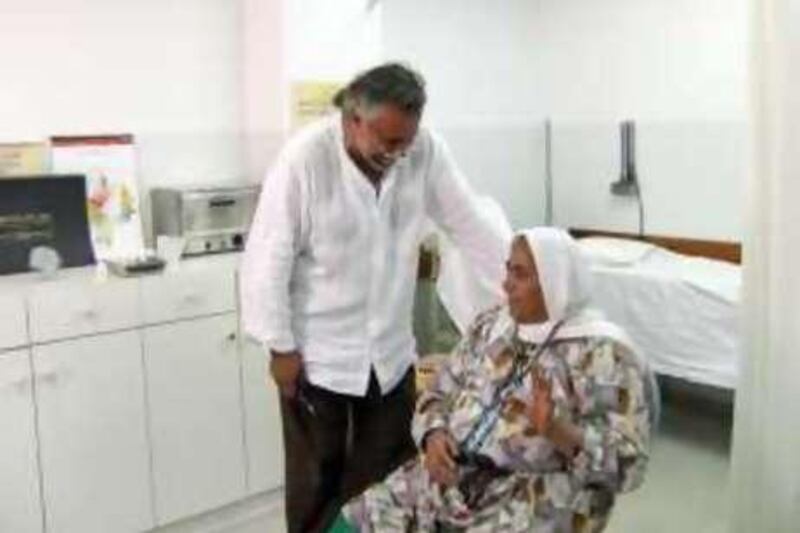DUBAI // When Dr Ali Dabbagh, a Dubai-based ophthalmologist, set off for the Palestinian Territories to launch the West Bank's first mobile eye clinic, he knew he had a job on his hands but hoped he could make a difference. After six weeks tending to patients and preparing the groundwork for the clinic, the size of the challenge he had set himself was beginning to sink in. "Honestly, I didn't realise the task in hand would be so enormous. It was utterly overwhelming and I completely underestimated the need which existed there," said the doctor, who works at the Imperial Healthcare Institute in Healthcare City. Following his summer trip to the West Bank, he has now implemented the first phase of his mission. So far, he has given talks on glaucoma as well as an introductory course to Medical Aid for Palestinians, the British charity, and plans many more. In addition, he has helped Beir Zeit University, in Ramallah, design software that will enable health care workers to photograph patients' eyes and send the pictures to Dr Dabbagh in Dubai for analysis. But he says this is just the start. For the past 25 years, Dr Dabbagh, who was born in Kuwait to Palestinian parents, has worked in some of the world's leading eye hospitals, including Royal Oldham Hospital in England and the Royal College of Surgeons in Ireland. Now, he wants to help people in a country where three-quarters of the population earn only Dh7 (US$2) a day and have little access to even the most basic health care. Trachoma, a bacterial eye infection, the most common cause of blindness, costs only Dh3.5 (US$1) to treat, but among the problems facing the Palestinian people it barely registers on the list of priorities. One focus of Dr Dabbagh's attention was the second-most common cause of blindness, diabetes. If undetected and untreated, eyesight deteriorates and eventually can be lost. "Diabetes is the silent killer and there are no specialist ophthalmic doctors to deal with the side effects which will eventually affect every sufferer," he said. There are only 66 ophthalmologists in the West Bank to serve its population of three to four million. Awareness of the side effects of diabetes is extremely low. "My main concern is raising awareness,"said Dr Dabbagh. "Right now it's nearly non-existent." Dr Dabbagh has three goals as he continues to set up his mobile clinic: raising awareness, screening and treatment. "Sight problems from diabetes can be easily screened for and it doesn't take expensive equipment, but awareness is needed as well as accessibility. "You can train doctors and health workers and it can be managed, but it won't change without education." "These people have more than enough on their plates to worry about without thinking about preventive care, but it's vital." One patient who Dr Dabbagh saw, Khetam Nimer Mohammed Amash, has lost two children to diabetes-related disorders. Her three remaining children are slowly dying. Two suffer from rapidly fading sight while the third has gone blind. She is given just 100 shekels (about Dh100) a month to care for her children. This is all spent on taxis and medication in one trip to the nearest hospital in Jericho, which takes two hours to reach from her home in Anapta on the outskirts of Tulkarm. Each week of his trip, Dr Dabbagh worked with a different one of the West Bank's five health providers, seeing around 10 to 15 patients a day from some of the poorest areas, such as Jenin and Nablus. Of all the obstacles he encountered, security checkpoints were the most frustrating and time-consuming. "The biggest problem there is moving around, it doesn't matter who you are or where you're from, even when I was in a Red Crescent ambulance. The ambulances get checked as much as anyone else. "With a system of frequent closures and a network of checkpoints, many patients are deterred from making a trip to the doctor." Healthcare provision is also haphazard, with the five main health providers having no continuous policy. "The Ministry of Health doesn't even know what each of these health providers is doing. There's no co-ordination and the workers in the field really need education." Dr Dabbagh admits there is much to do. He still hopes to set up a fully-operational screening programme to identify diabetes and glaucoma sufferers. He also wants to provide training workshops for family doctors, paramedics and health organisations in remote centres. Once the equipment and training of staff is completed, he will also provide essential laser treatment for diabetes and glaucoma patients. "This is a long-term project which I am dedicating as much time to as I can. It's so important and I don't always need to be there to be able to do good." For information on how to donate to Dr Dabbagh's West Bank clinic, he can be reached by e-mail at alidabbagh69@hotmail.com mswan@thenational.ae
Eye care on West Bank a 'huge task' for doctor
When Dr Ali Dabbagh set off to launch the West Bank's first mobile eye clinic, he knew he had a job on his hands.

More from the national





